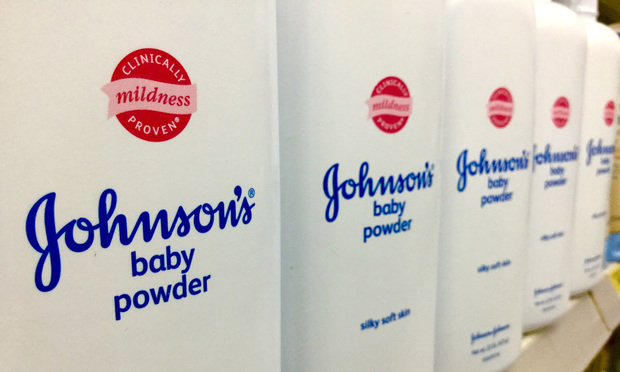J&J, Imerys Hit With $80M in Punitives Over Claims Linking Talc to Mesothelioma
Johnson & Johnson and Imerys Talc America were hit with an $80 million punitive damages verdict Wednesday in a suit by a New Jersey man who said he developed mesothelioma from using Johnson's Baby Powder. Total damages in the case rose to $117 million with the addition of today's verdict to last week's $37 million in compensatory damages.
April 11, 2018 at 04:07 PM
7 minute read

Johnson & Johnson and Imerys Talc America were hit with an $80 million punitive damages verdict Wednesday in a suit by a New Jersey man who said he developed mesothelioma from using Johnson's Baby Powder. Total damages in the case rose to $117 million with the addition of today's verdict to last week's $37 million in compensatory damages.
The jury apportioned $55 million of the punitive damages to Johnson & Johnson and the other $25 million to Imerys. The jury made the award after deliberating for about three hours. The verdict was handed up in New Jersey Superior Court for Middlesex County. Middlesex County is home to J&J's headquarters in New Brunswick, New Jersey.
The jury awarded $30 million to plaintiff Stephen Lanzo III and another $7 million to his wife, Kendra, for loss of consortium. That verdict was apportioned 70 percent to Johnson & Johnson and 30 percent to Imerys. Lanzo claimed he used Johnson's Baby Powder and another Johnson & Johnson product, Shower to Shower body powder, generously during grooming from 1972 until 2003. A father of three, Lanzo was diagnosed with mesothelioma in 2016.
J&J sold the Shower to Shower brand to Valeant in 2012.
The verdict is the first nationwide in which a jury sided with a plaintiff who claimed that talc products sold by Johnson & Johnson caused mesothelioma. One other such case, brought by plaintiff Tina Herford, ended in a defense verdict in November 2017 in Los Angeles Superior Court.
Plaintiff lawyer Moshe Maimon of Levy Konigsberg in New York urged jurors in his final remarks before deliberation that punitive damages were warranted because Johnson & Johnson placed a product in the marketplace despite knowing it could put users in mortal risk, and failed to warn users of its products about possible health risks. Although punitive damages are intended to be a rarely used remedy, Maimon said they were warranted for both defendants because they acted willfully and wantonly in disregard for the health of people using their products.
Maimon, citing the Food and Drug Administration's decision not to place a warning label on Johnson & Johnson talc products, told jurors they could act to protect the safety of children where government regulators had not.
Johnson & Johnson had argued that punitive damages were not warranted because evidence in the case failed to reach the clear and convincing standard. In the context of the present case, that would have required that the company have actual knowledge of asbestos in its final product and that the level of asbestos in its product was “practically certain to cause both imminent and serious harm,” the company said in court papers. Johnson & Johnson maintained that there was no level of asbestos in its products, let alone a level that was practically certain to cause harm, the company said.
Johnson & Johnson also faces more than 5,000 suits by women who claim they developed ovarian cancer from using J&J talc products for feminine hygiene.
On Monday, Johnson & Johnson's lawyers asked Superior Court Judge Ana Viscomi to sever its punitive damages trial from that of Imerys, which is accused of supplying talc that contained asbestos to Johnson & Johnson. A difference in proofs of culpability between the two defendants, including an adverse inference against Imerys for an evidentiary issue, would make it impossible for Johnson & Johnson to get a fair punitive damages trial, the company said in court papers. But Viscomi declined to sever the damage trials.
J&J's bid to sever the two defendants' damages trials arose from a ruling by Viscomi that jurors could infer the presence of asbestos in Imery's talc due to its destruction of some talc samples and its failure to produce talc samples or disclose their destruction during discovery.
Johnson & Johnson said in a statement that it would appeal the verdict.
“Johnson's Baby Powder has been used for more than 120 years and it does not contain asbestos or cause mesothelioma. After suffering multiple losses through court rulings and at trial, plaintiff's attorneys have shifted their strategy and are now alleging that talcum powder is contaminated with asbestos, despite multiple independent, non-litigation-driven scientific evaluations which have found that our baby powder does not contain asbestos. Throughout this trial, we were prevented from presenting evidence we believe would have been important to the jury in their deliberations, which forced us to file multiple mistrial motions. We will continue to defend the safety of Johnson's Baby Powder and immediately begin our appeal, and we believe that once the full evidence is reviewed, this decision will be reversed,” spokeswoman Carol Goodrich said in a statement.
Imerys spokeswoman Gwen Myers said in a statement that the “evidence was clear that [the plaintiff's] asbestos exposure came from a different source such as the asbestos found in his childhood home or schools, and the jury's decision is inconsistent with a recently published study of workers who mined and milled talc all day over the course of more than 50 years that did not find a single case of mesothelioma.”
Myers added, “Imerys follows all FDA and other regulatory guidelines and utilizes rigorous testing to ensure that our talc meets the highest quality standards, and we are just as confident in the safety of our products as ever. We intend to appeal this decision and will continue to stand by the safety of our product.”
The plaintiff's victory is striking, but the defendants have a good opportunity on appeal to challenge the science in the plaintiff's case, said Mark Raffman of Goodwin Procter in Washington, D.C., who has 30 years' experience defending complex litigation matters in state and federal courts nationwide.
“With this product being used this widely, there ought to be a pretty strong epidemiology,” said Raffman.
“I think ultimately J&J has to figure out how to prove to juries their product doesn't contain asbestos. They're either going to have to figure how to persuade juries or else they're going to have to figure out how to build strong cases on appeal,” Raffman said.
Ted Meadows of Beasley Allen in Montgomery, Alabama, who represents numerous women with ovarian cancer in talc litigation with J&J, said he was watching the Lanzo case closely.
“The evidence presented in this trial, and in previous trials, clearly shows that Johnson & Johnson and Imerys have known about the links between talcum powder and cancer for decades. Rather than protect consumers by pulling those products from the market, or even properly labeling those products, the companies chose to engage in obstruction, influence-peddling and subterfuge to conceal the facts,” Meadows said in a statement.
Baby Powder and Shower to Shower products, just like cigarettes, contain multiple cancer-causing substances, including talc, asbestos and heavy metals, Meadows said. He said this evidence has been and will be presented to juries in both lung cancer and ovarian cancer cases in the upcoming months.
This content has been archived. It is available through our partners, LexisNexis® and Bloomberg Law.
To view this content, please continue to their sites.
Not a Lexis Subscriber?
Subscribe Now
Not a Bloomberg Law Subscriber?
Subscribe Now
NOT FOR REPRINT
© 2025 ALM Global, LLC, All Rights Reserved. Request academic re-use from www.copyright.com. All other uses, submit a request to [email protected]. For more information visit Asset & Logo Licensing.
You Might Like
View All


On the Move and After Hours: Buchanan; Malamut Law; Genova Burns; Faegre Drinker
3 minute read
Trending Stories
- 1Uber Files RICO Suit Against Plaintiff-Side Firms Alleging Fraudulent Injury Claims
- 2The Law Firm Disrupted: Scrutinizing the Elephant More Than the Mouse
- 3Inherent Diminished Value Damages Unavailable to 3rd-Party Claimants, Court Says
- 4Pa. Defense Firm Sued by Client Over Ex-Eagles Player's $43.5M Med Mal Win
- 5Losses Mount at Morris Manning, but Departing Ex-Chair Stays Bullish About His Old Firm's Future
Who Got The Work
J. Brugh Lower of Gibbons has entered an appearance for industrial equipment supplier Devco Corporation in a pending trademark infringement lawsuit. The suit, accusing the defendant of selling knock-off Graco products, was filed Dec. 18 in New Jersey District Court by Rivkin Radler on behalf of Graco Inc. and Graco Minnesota. The case, assigned to U.S. District Judge Zahid N. Quraishi, is 3:24-cv-11294, Graco Inc. et al v. Devco Corporation.
Who Got The Work
Rebecca Maller-Stein and Kent A. Yalowitz of Arnold & Porter Kaye Scholer have entered their appearances for Hanaco Venture Capital and its executives, Lior Prosor and David Frankel, in a pending securities lawsuit. The action, filed on Dec. 24 in New York Southern District Court by Zell, Aron & Co. on behalf of Goldeneye Advisors, accuses the defendants of negligently and fraudulently managing the plaintiff's $1 million investment. The case, assigned to U.S. District Judge Vernon S. Broderick, is 1:24-cv-09918, Goldeneye Advisors, LLC v. Hanaco Venture Capital, Ltd. et al.
Who Got The Work
Attorneys from A&O Shearman has stepped in as defense counsel for Toronto-Dominion Bank and other defendants in a pending securities class action. The suit, filed Dec. 11 in New York Southern District Court by Bleichmar Fonti & Auld, accuses the defendants of concealing the bank's 'pervasive' deficiencies in regards to its compliance with the Bank Secrecy Act and the quality of its anti-money laundering controls. The case, assigned to U.S. District Judge Arun Subramanian, is 1:24-cv-09445, Gonzalez v. The Toronto-Dominion Bank et al.
Who Got The Work
Crown Castle International, a Pennsylvania company providing shared communications infrastructure, has turned to Luke D. Wolf of Gordon Rees Scully Mansukhani to fend off a pending breach-of-contract lawsuit. The court action, filed Nov. 25 in Michigan Eastern District Court by Hooper Hathaway PC on behalf of The Town Residences LLC, accuses Crown Castle of failing to transfer approximately $30,000 in utility payments from T-Mobile in breach of a roof-top lease and assignment agreement. The case, assigned to U.S. District Judge Susan K. Declercq, is 2:24-cv-13131, The Town Residences LLC v. T-Mobile US, Inc. et al.
Who Got The Work
Wilfred P. Coronato and Daniel M. Schwartz of McCarter & English have stepped in as defense counsel to Electrolux Home Products Inc. in a pending product liability lawsuit. The court action, filed Nov. 26 in New York Eastern District Court by Poulos Lopiccolo PC and Nagel Rice LLP on behalf of David Stern, alleges that the defendant's refrigerators’ drawers and shelving repeatedly break and fall apart within months after purchase. The case, assigned to U.S. District Judge Joan M. Azrack, is 2:24-cv-08204, Stern v. Electrolux Home Products, Inc.
Featured Firms
Law Offices of Gary Martin Hays & Associates, P.C.
(470) 294-1674
Law Offices of Mark E. Salomone
(857) 444-6468
Smith & Hassler
(713) 739-1250






